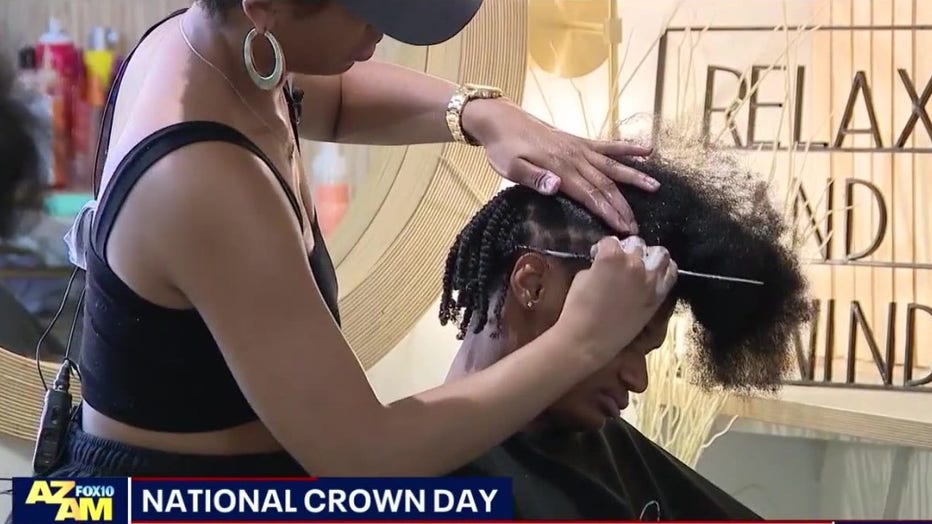What the Crown Act means for people of color | National Crown Day

National Crown Day 2024
It's National Crown Day. We're hearing from activists about the push for a national law, similar to one that was signed into law in Arizona a little over a year ago. FOX 10's Desiree Fluellen reports.
PHOENIX - July 3 is National Crown Day – a day commemorating the signing of the first Crown Act legislation in the country. It's designed to protect Black children and adults who wear their natural hair without fear of discrimination at work or school.
The legislation was adopted in Arizona more than a year ago. Now we're reflecting on that day and what the Crown Act means for people of color.
"The signing of the bill is very symbolic of the change that needs to happen."
On March 17, 2023, Arizona Governor Katie Hobbs signed the Crown Act to prevent state agencies and state contracts from race-based hair discrimination.
Janelle Wood, a pastor, activist, and founder of the Black Mothers Forum, was there that day.
"I believe this was a step in the right direction, like any piece of legislation you can build upon it, you can amend it, and you can add to it."

CROWN Act: Tempe is 2nd Arizona city to pass hair discrimination ban
Tempe is now the second Arizona city to ban discrimination based on hair texture and hairstyles, including at schools and in the workplace.
Wood says many questions surrounding the legislation still remain: What state agency enforces the Crown Act? How does someone file a complaint, and what are the penalties?
"A year later, now we need to take up the mantle now again, and say what does this look like, if for some reason, I do encounter this?"
Race-based hair discrimination started centuries ago after slavery. Items such as the hot comb and relaxers were used to achieve "good hair."
"We had all this hair oil because we had to lay it down, and it had to be so straight on the edges so that you could favor a white woman," said Woods.

The history is deeply rooted, but a recent Crown Act study in 2019 shows Black children have experienced hair discrimination by the age of 5, and Black women are 2.5 times more likely to be perceived as "unprofessional." Both experiences Wood has had, especially during her hair journey using weaves and extensions.
"Guess what? With that weave and with that look, I was able to move up in corporate America. I was able to sit in those board meetings, and to sit in management seats, and I was accepted."
At the age of 50, she freed herself from her hair, cutting it all off.
"Hair is so important to women.. how long it is, what our texture is.. that has been something that’s part of our identity."
But she says it shouldn't define who you are, nor subject you to discrimination.
"We need to look at ourselves and go, I am beautiful just the way I am, and I don’t need you to define me."
As for the Crown Act, this is her hope for its future.
"I hope at the federal level we can get it passed. I know it got hung up in the Senate at the federal level, the House overwhelmingly passed it, but we had to hang up in the Senate. I’m glad that the states that have passed it have passed it, but we still have a long ways to go."
The Crown Act stands for Creating a Respectful and Open World for Natural Hair.
You can show your support and pride for your hair by using the hashtag #crownlove. More information can be found at https://www.thecrownact.com.



